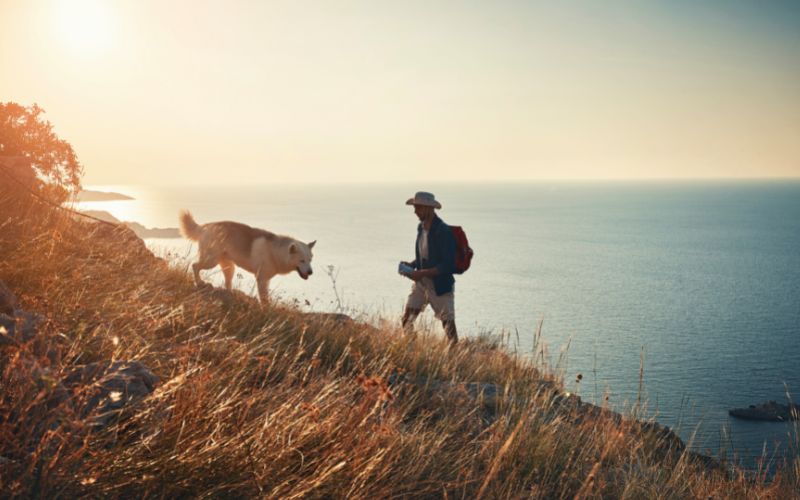Why hike alone when you can bring man’s (or woman’s) best friend? Their love for the great outdoors is written in their DNA, and they never complain about the miles or the lack of M&Ms in the trail mix! With that said, some dog breeds do better with backcountry miles than others. If you’re looking to add a furry companion to your hiking crew, it’s a good idea to familiarize yourself with the breeds that make the best hiking buddies.
In our list, we discuss the 15 most hiking-compatible dog breeds. Which pups are best suited to winter wanders and which for summertime sprints? Some love the water, while others need to be watched in case they catch a scent and disappear! This guide will walk you through each of the 15 breeds’ strengths and limitations, advise on breeds that aren’t suitable for hiking, and highlight breeds best for hiking in bear country.
Listed below are the top 15 dog breeds ideal for hiking with.
1. Siberian Husky
2. Dalmatian
3. Bernese Mountain Dog
4. English Springer Spaniel
5. Border Collie
6. Rhodesian Ridgeback
7. Harrier
8. Australian Shepherd
9. Jack Russell Terrier
10. Miniature Pinscher
11. German Shorthaired Pointer
12. Labrador Retriever
13. Alaskan Malamute
14. Golden Retriever
15. Poodle
Table of Contents
- 1. Siberian Husky
- 2. Dalmatian
- 3. Bernese Mountain Dog
- 4. English Springer Spaniel
- 5. Border Collie
- 6. Rhodesian Ridgeback
- 7. Harrier
- 8. Australian Shepherd
- 9. Jack Russell Terrier
- 10. Miniature Pinscher
- 11. German Shorthaired Pointer
- 12. Labrador Retriever
- 13. Alaskan Malamute
- 14. Golden Retriever
- 15. Poodle
- Which Dog Breeds Should You Not Take Hiking?
- What Are The Best Dogs For Walking In Bear Country?
- Best Dogs for Hiking: Which Breeds are Best?
1. Siberian Husky
Siberian Huskies need lots of physical and mental stimulation. Recognized for their sled-pulling prowess in challenging environments, Huskies possess boundless energy and endurance. Taking them hiking with you will prevent them from getting bored (and tearing up your house!). However, due to their independent and stubborn temperament, you’ll need to invest in consistent training before attempting any off-leash hikes.
If you’re planning on regularly hiking in cold conditions, there’s no better trail pal than a Siberian Husky. These dogs have a double fur coat that protects them from the elements, so they’ll have no trouble tagging along during all your winter adventures. They’ll feel right at home accompanying you on any winter hike or mountain trek.
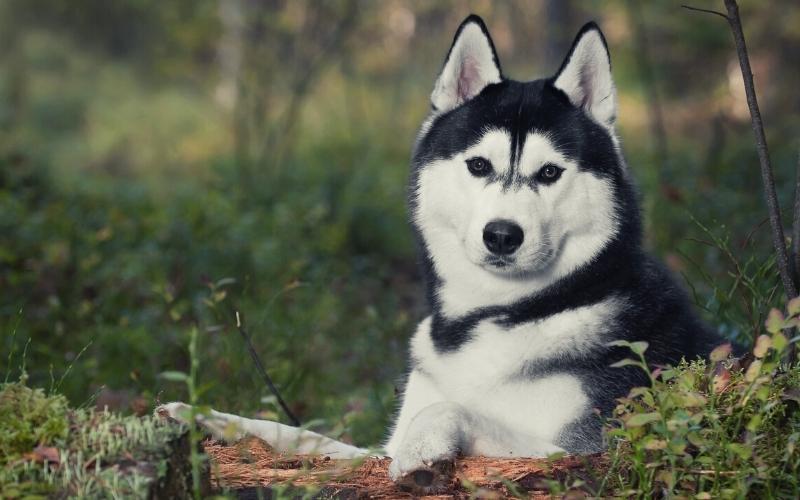
2. Dalmatian
Dalmatians’ friendly and energetic nature makes them popular family pets and ideal trail-running or hiking companions. They also have a low prey drive so you won’t need to worry about them chasing after every sight and sound in the forest. Keep in mind, that Dalmatians don’t cope as well in cold climates, so they’ll need extra protection if hiking in the winter.
These dogs have a long and rich history of working alongside humans. Historically bred as hunting dogs, their strong and streamlined bodies make them natural athletes suited to a variety of physical tasks. Some Dalmatians were even used as carriage dogs to protect passengers during long stagecoach voyages, so they make great guard dogs!
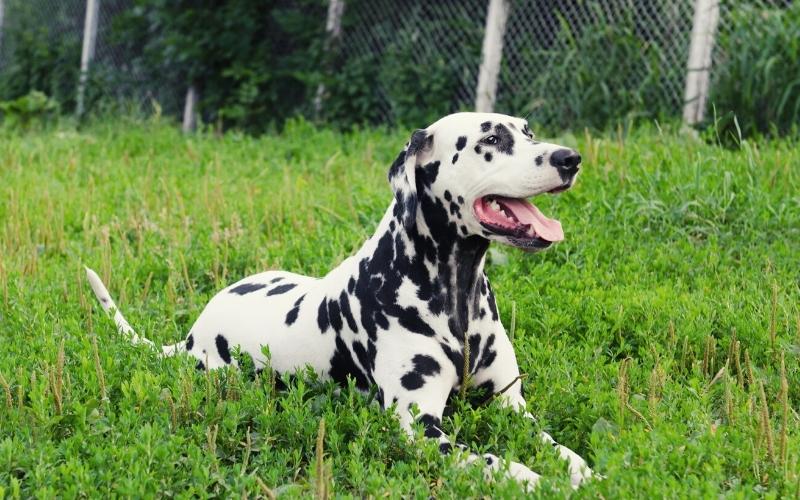
3. Bernese Mountain Dog
With “mountain” in their name, how could a Bernese Mountain Dog not love hiking? These are hearty and good-natured creatures that are always ready to traipse wherever you want to take them. Remember, Bernese Mountain Dogs don’t tolerate heat well, largely due to their wooly, thick coat. It’s normal for these pups to be less active in the summer, so save any long-distance hikes for the spring or fall.
Like other alpine breeds, they originated as Swiss working dogs. Originally bred to pull carts through the Alps, this energetic breed will have no problem scaling mountains by your side. However, Bernese can suffer from genetic issues, especially surrounding their hips. Make sure you get the OK from a vet before setting off on your outdoor adventures together.
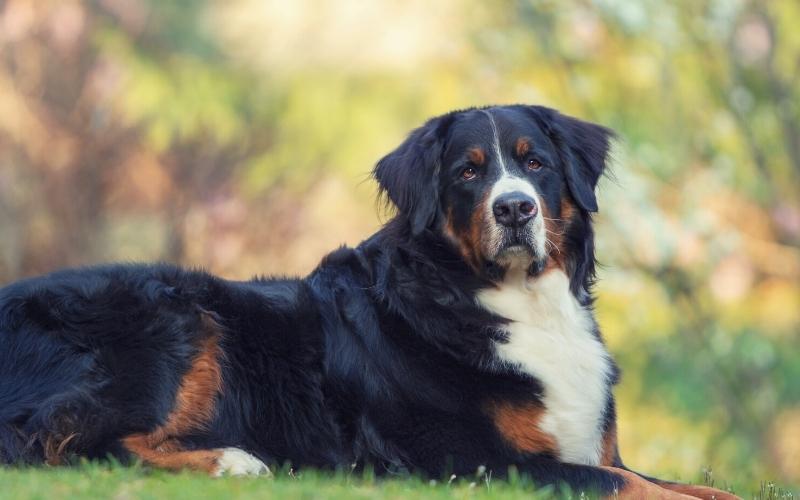
4. English Springer Spaniel
Exceptionally intelligent and bursting with energy, English Springer Spaniels make excellent lap dogs and even better hiking companions. Despite their luxurious coats, Springer Spaniels are tough hunting dogs accustomed to spending days on the hunt. They certainly have enough endurance to leave you trailing in their wake!
As with most intelligent dog breeds, Springer Spaniels crave companionship and require lots of training and positive reinforcement to avoid boredom. Without adequate attention and exercise, Springer Spaniels can develop destructive habits or separation anxiety.
Thankfully, there’s no better way to let high-energy breeds like Springer Spaniels burn off some steam than taking them on a long hike or run!
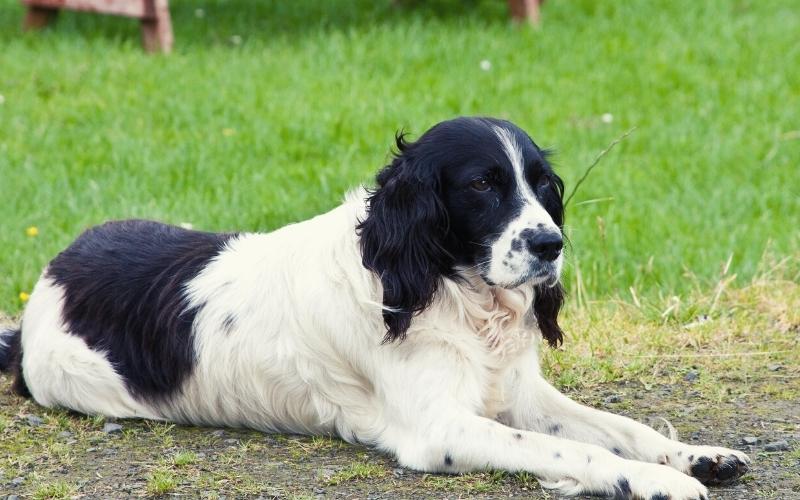
5. Border Collie
Border Collies are talented, energetic, and renowned for their high intelligence. Always eager to hit the trail or summit, they are the ideal trail-walking companions for active dog owners. Make sure they receive lots of daily exercise so they can burn off their seemingly boundless enthusiasm.
Thanks to their history as herding dogs, Border Collies are easy to train and love to please their humans. You’ll have no problem training your Border Collie to walk off-leash and stay close to you while on hiking trails.
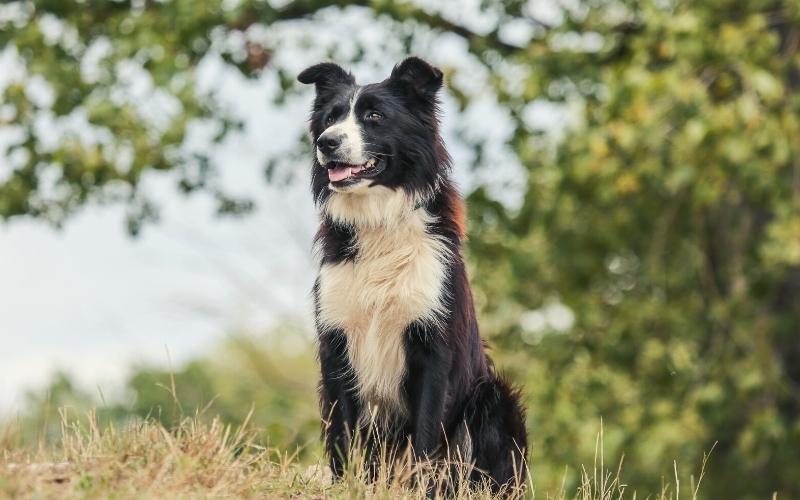
6. Rhodesian Ridgeback
The Rhodesian Ridgeback is a rugged and reliable outdoor companion. Their strength, agility, and endurance make them fantastic trail pals, but their independent nature and aloof personality require proper obedience training. Ensure you invest in the right training before allowing them off-leash on the trail.
Originally bred as a South African hunting dog, Rhodesian Ridgebacks are used to working in high temperatures, making them good hiking dogs for people living in hot climates. The Rhodesian Ridgeback was originally used to track lions and other large mammals in the wild. As such, no long hike or challenging ascent will faze this gentle giant.

7. Harrier
Harriers are highly energetic dogs that require an outlet for their energy. Being hound dogs, they’re also quite vocal! If you live in an apartment or close to neighbors, you may want to consider a quieter dog breed.
The Harrier is often mistaken for a large beagle, but they’re their own distinct breed. Harriers were originally used as scent hounds to hunt foxes and hares. However, their love for the outdoors makes them faithful trail companions as well.

8. Australian Shepherd
Herding dogs like Australian Shepherds make excellent outdoor companions. Agile, athletic, and highly intelligent, your only challenge on the trail might be keeping pace with them!
Herding cattle is a tough job, especially in the unforgiving climate of the Australian outback. A few mountain climbs or long treks in hot weather, therefore, will be no match for this working dog!
While Australian Shepherds enjoy hiking, they need regular daily exercise too. Before you choose this energetic and loyal breed, make sure you can commit to an hour of vigorous exercise each day.
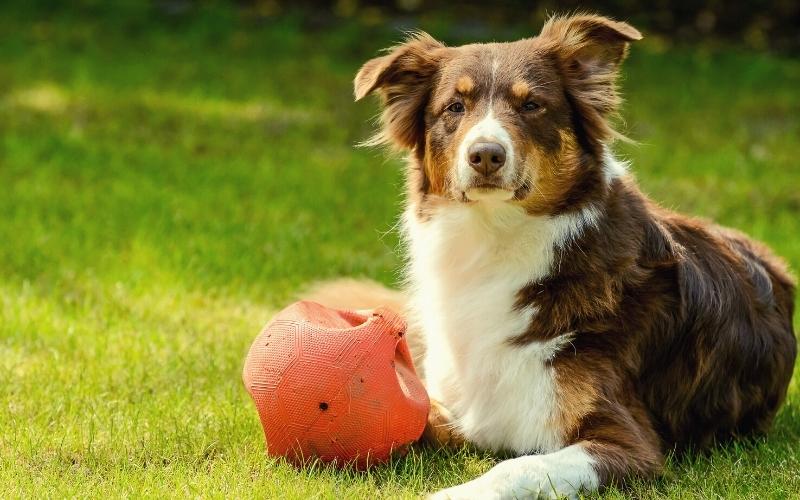
9. Jack Russell Terrier
Despite their short stature, Jack Russell Terriers are athletic and full of energy, thriving on a mix of outdoor activities and regular exercise. While they may not seem like an obvious choice, they were originally trained for vermin hunting, with that stamina translating well into running, hiking, and camping.
Jack Russell Terriers also love being close to their human companions and will happily follow you down any hiking trail. Just remember that they do have a strong prey drive, so don’t let them hike off-leash unless you want them chasing after every critter in the forest.
If you’re looking for a hiking partner but aren’t ready to commit to a large breed, a Jack Russell Terrier could be a great fit for you!
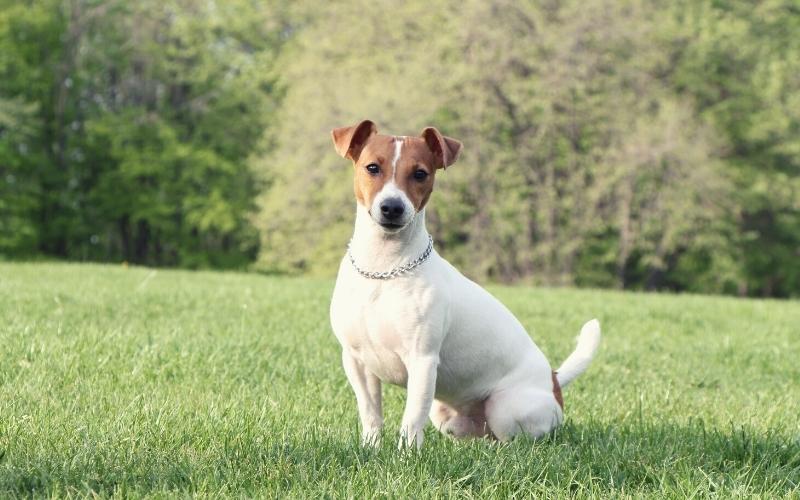
10. Miniature Pinscher
Don’t let the size of this small dog fool you – Miniature Pinschers are feisty and active, making them great hiking partners. Originating in Germany, they only reach a size of 8–10 lbs as fully grown adults. Their small size doesn’t faze them, and these fearless canines will welcome any hike as a challenge! Despite their boundless energy, it’s advisable to carry a dog carrier or backpack in case their short legs get tired.
Like other small breeds, Miniature Pinschers suffer from a condition called luxating patella where their kneecaps pop out of place. Regular hikes are a great way to keep them lean and help prevent this condition.
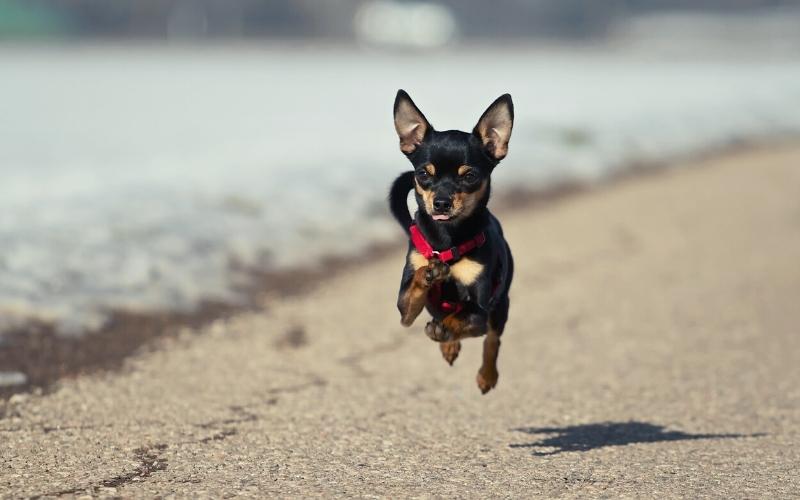
11. German Shorthaired Pointer
The German Shorthaired Pointer’s history as a hunting dog makes it well-suited to outdoor adventures. Known for their speed, endurance, and keen sense of smell, Pointers thrive on lots of off-leash exercise. Like retrievers, they have webbed feet and a water-resistant coat, making them adept swimmers. However, unlike Golden Retrievers that have long coats, Pointers can easily get too cold.
Due to their razor-sharp instincts and high prey drive, pointers can become destructive if they don’t have an outlet for their energy. Thankfully, they’re highly intelligent and eager to please, so your German Shorthaired Pointer will be well-trained in no time!
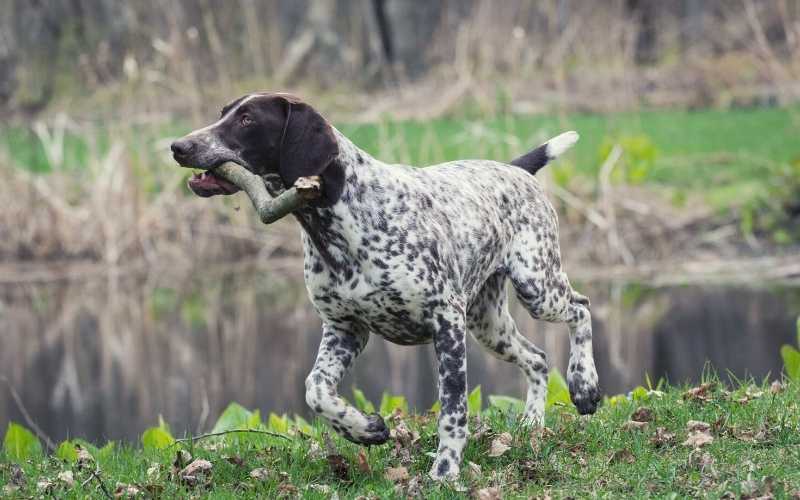
12. Labrador Retriever
Labrador Retrievers are arguably the most beloved breed, loving to spend time outdoors. Active, friendly, and water-loving, a Labrador Retriever makes the perfect companion for a long trek or a dip in the lake.
Originating as gun dogs, their webbed feet make them excellent swimmers while their water-repellent coats allow them to thrive in cold climates helping them to retrieve waterfowl for hunters.
Labradors are prone to gaining weight if they are not regularly exercised – all the more reason to make a Labrador your next hiking partner!
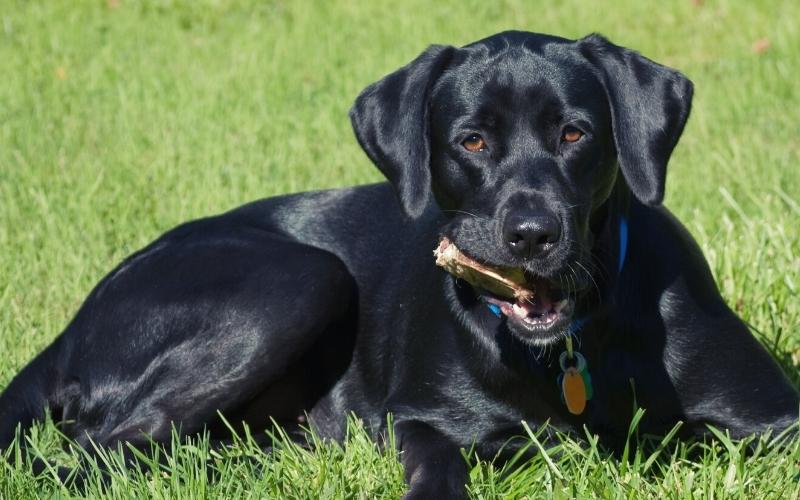
13. Alaskan Malamute
If you regularly hike or climb in snowy, rough terrain, an Alaskan Malamute will make the perfect buddy! Alaskan Malamutes are one of the oldest Arctic sled breeds and were bred to thrive in cold climates. Due to their thick, double-fur coat, Malamutes can only handle temperatures of 70 degrees or below. Their huge paws act like snowshoes, allowing them to walk on soft snow with ease, while their sharp claws grip onto ice like ice picks.
Like many other dogs on our list, Malamutes have a stubborn and independent nature. You’ll need to invest in lots of training and positive enforcement before allowing them off-leash on hiking trails.
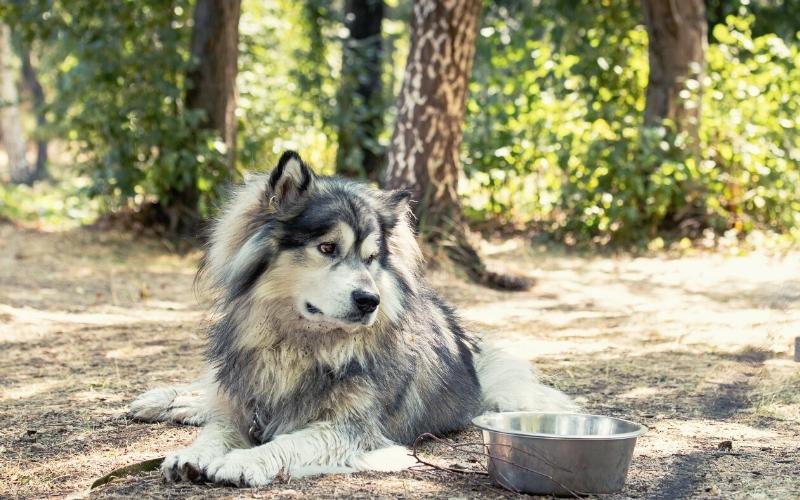
14. Golden Retriever
Golden Retrievers have been loyal companions to families worldwide since the 1800s. They originated in the Scottish Highlands, where they were revered for their hunting abilities both on land and in the water. Their hardworking nature lends itself well to outdoor activities, and they’ll have no problem accompanying you on long hikes.
Although Golden Retrievers are active dogs that will happily join you on any trek, they do suffer from a genetic predisposition to hip problems. Make sure you get the OK from a veterinarian before undertaking any vigorous physical activity or hiking long distances with your golden in tow.
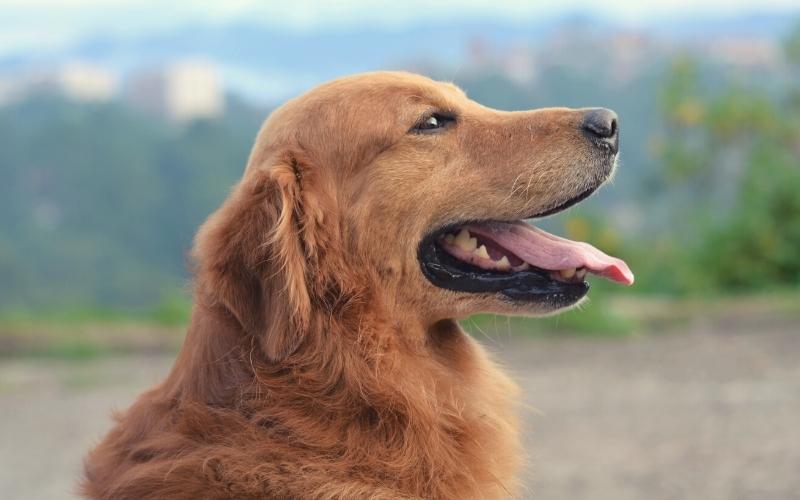
15. Poodle
Poodles are highly intelligent and athletic canines originally bred for hunting waterfowl. They love to please their humans, making them highly trainable both on and off-leash. Despite their high-maintenance coat, Poodles are tough dogs that make loyal trail companions and great running buddies. During the winter, you can keep their curls long to help them manage low temperatures. In the summer, their coats can be shaved to help keep them cool.
Hiking is an activity that you can do with any Poodle, but you’ll want to limit your trek to 1 mile or less for Toy Poodles and under 5 miles for miniatures (and make sure to bring along a dog carrier too).

Which Dog Breeds Should You Not Take Hiking?
While all canines appreciate regular exercise, some dog breeds aren’t suitable for strenuous hikes or long-distance treks. Breeds like Pugs, Shih Tzus, Bulldogs, and Boxers have respiratory issues due to their very short muzzles, leading to difficulties in running and hiking. Since dogs use breathing and panting to cool themselves down, these breeds can also struggle in the heat and are prone to heat exhaustion.
While these breeds still make wonderful companions, they aren’t the most suitable for covering long distances or hiking.
Regardless of the breed, you should always be wary about hiking with dogs with a high prey drive. These dogs want to follow their natural instinct to chase down prey and can quickly become overwhelmed in a natural environment that’s full of wildlife.
Always make sure your dog is properly trained to walk on a leash and come when called before heading off on a hike together.
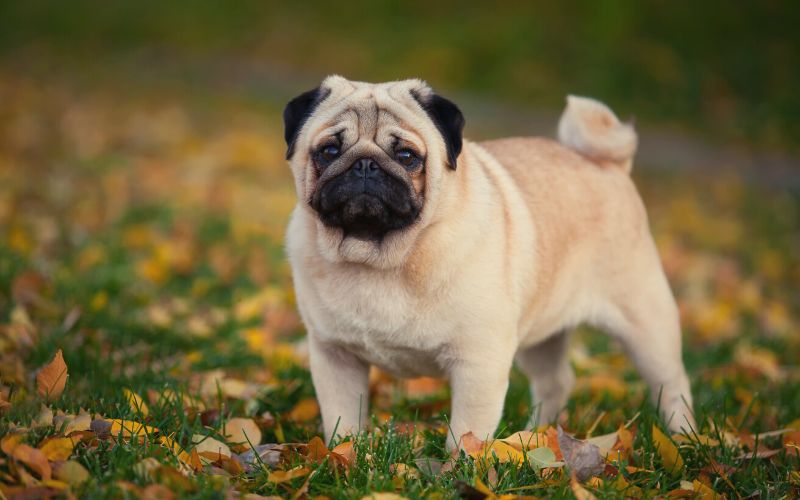
What Are The Best Dogs For Walking In Bear Country?
The best dogs for hiking in bear country will be well-trained, obedient, and will alert you to the presence of bears or other wildlife.
Some of the best breeds for hiking in bear country include the Alaskan Malamute, Bernese Mountain Dog, and Greater Swiss Mountain Dog. These large breeds have a strong and confident presence, which can help deter bears from approaching. Known for their loyalty and protectiveness, which provide a sense of security while hiking in the wilderness.
Remember, no dog can guarantee safety from bears, so always be vigilant and follow bear safety guidelines while hiking. Train your dog to stay close and respond to your commands to minimize the risk of bear encounters.
Best Dogs for Hiking: Which Breeds are Best?
While all pups love to exercise, some breeds thrive on outdoor adventures, and the 15 listed above are the most trail-ready of the bunch. We hope our guide on the best dogs for hiking has inspired you to find your own four-legged companion for all your treks!
Did we forget your favorite outdoor-loving breed? Let us know in the comments below and don’t forget to share our list with all your dog-loving friends!
